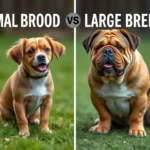
Introduction
When it comes to choosing a dog breed, the options are vast, and the decision often hinges on personal preferences, lifestyle, and living conditions. Two breeds that have gained immense popularity among dog lovers are the Corgi and the Golden Retriever. Both breeds bring unique characteristics to the table and have their own set of dedicated followers. Understanding the nuances of each breed is essential for anyone considering adding a furry friend to their family.
In this article, we will delve deeper into the Corgi vs Golden Retriever discussion, exploring their origins, physical traits, personalities, health considerations, and ideal living conditions. This comprehensive guide aims to provide you with the information necessary to make an informed choice based on your lifestyle and preferences.
Understanding Dog Breeds
The Importance of Dog Breeds
Dog breeds are distinct groups of dogs that have been selectively bred over generations for particular traits, behaviors, and physical characteristics. Each breed has a unique history that influences their temperament, appearance, and skills. Breeds are categorized based on various factors, including size, purpose (such as herding or companionship), and physical traits.
Genetics plays a crucial role in these characteristics. Understanding the breed’s background can help potential dog owners anticipate future behavior and care needs, which ultimately contributes to a harmonious relationship between owner and pet.
Factors to Consider When Choosing a Dog Breed
Choosing the right breed involves assessing several factors:
- Lifestyle compatibility: Consider how active you are and what your daily routine looks like.
- Space requirements: Some breeds require more room to roam than others.
- Activity levels: Certain dogs need more exercise and stimulation.
- Allergies and grooming needs: Some breeds shed more than others, which can be a concern for allergy sufferers.
Corgis – An In-Depth Look
History and Origin of Corgis
The Corgi breed is divided into two main types: the Pembroke and the Cardigan. Originating from Wales, these dogs were primarily bred for herding cattle and served as companions to farmers. The Pembroke Corgi is known for its short tail, while the Cardigan has a long tail. Both types have a rich history and have evolved into beloved family pets and show dogs.
Physical Characteristics
Corgis are small to medium-sized dogs, typically weighing between 25 to 30 pounds. Their distinctively short legs and long bodies give them an endearing appearance. Corgis come in various coat colors, including fawn, black, and tan, often with white markings. Their large, erect ears add to their charm, making them easily recognizable.
Personality and Temperament
Corgis are known for their friendly, affectionate nature. They are highly social dogs that thrive on interaction with their families. Generally, they are good with children and other pets, making them an excellent choice for family-oriented homes. Their intelligence makes them eager to learn, although they can sometimes exhibit a stubborn streak.
Health Considerations
Corgis are prone to certain health issues, such as hip dysplasia and intervertebral disc disease due to their long backs. Regular veterinary check-ups and a healthy diet are essential for maintaining their well-being. On average, Corgis have a lifespan of 12 to 15 years.
Ideal Living Conditions
Corgis can adapt to various living situations, from apartments to larger homes, as long as they receive enough exercise. They enjoy daily walks and playtime, which helps keep them mentally and physically stimulated.
Golden Retrievers – An In-Depth Look
History and Origin of Golden Retrievers
The Golden Retriever is a breed known for its loyalty and intelligence. Developed in Scotland during the late 19th century, they were originally bred for retrieving game during hunting expeditions. Over the years, Golden Retrievers have also become popular as service dogs due to their friendly demeanor and trainability.
Physical Characteristics
Golden Retrievers are larger than Corgis, typically weighing between 55 to 75 pounds. Their coats are dense and water-repellent, with a golden hue ranging from light cream to dark gold. They have a strong build and a friendly expression, characterized by their feathered fur on the legs, chest, and tail.
Personality and Temperament
Golden Retrievers are known for their friendly and gentle nature. They excel in family settings, interacting positively with children and other pets. They are intelligent and eager to please, which makes them highly trainable. Their playful spirit and loving disposition make them a favorite among dog owners.
Health Considerations
Like Corgis, Golden Retrievers are also prone to specific health issues, including hip dysplasia and heart problems. Their lifespan typically ranges from 10 to 12 years. Regular exercise, proper nutrition, and veterinary care are vital for maintaining their health.
Ideal Living Conditions
Golden Retrievers thrive in homes with access to outdoor space, as they require ample exercise to stay healthy and happy. They enjoy activities like swimming, running, and playing fetch, making them a great fit for active families.
Corgi vs Golden Retriever – A Comparative Analysis
Size and Space Requirements
When comparing Corgis vs Golden Retrievers, size is a significant factor. Corgis are compact and can live comfortably in smaller spaces, while Golden Retrievers require more room to roam and play. If you live in an apartment, a Corgi may be the better choice, whereas a house with a yard would be ideal for a Golden Retriever.
Temperament and Behavior
Both breeds exhibit friendly and sociable traits, but their personality nuances differ. Corgis may be more independent and occasionally stubborn, while Golden Retrievers are typically more eager to please and trainable. Both breeds are excellent with families, but Golden Retrievers tend to be more patient and gentle, making them ideal for homes with young children.
Grooming Needs
In terms of grooming, both breeds shed, but Golden Retrievers have a higher grooming requirement due to their longer fur. Corgis have a double coat that requires regular brushing, especially during shedding seasons.
Exercise and Activity Levels
Golden Retrievers generally need more exercise compared to Corgis. They thrive on vigorous activities such as running and swimming, while Corgis require regular walks and playtime but can get sufficient exercise in smaller spaces.
Trainability and Intelligence
Both breeds are intelligent, but their learning styles differ. Golden Retrievers tend to excel in obedience training due to their eagerness to please, while Corgis may require a bit more patience and consistency in training.
Making the Right Choice for You
Assessing Your Lifestyle
Before deciding between a Corgi vs Golden Retriever, assess your lifestyle. Consider your daily activity level, the amount of time you can dedicate to training and exercise, and your living space. Ask yourself the following questions:
- How much time can I commit to daily walks and playtime?
- Do I have enough space for a larger dog?
- Am I looking for a dog that is easy to train?
Adoption vs. Breeding
When choosing between adoption and purchasing from a breeder, consider the pros and cons of each option. Adopting a dog from a shelter can provide a loving home for a pet in need, while getting a puppy from a reputable breeder allows you to learn about the dog’s background and health history. Research local shelters, rescue organizations, and breeding programs to find the best fit for you.
Conclusion
In the ongoing debate of Corgi vs Golden Retriever, both breeds offer unique qualities that cater to different lifestyles and preferences. Corgis are compact, intelligent, and friendly, making them great for smaller living spaces, while Golden Retrievers are larger, active, and known for their loyalty, which suits families with ample outdoor space. Ultimately, the right choice depends on your lifestyle, activity level, and personal preferences.
Choosing a dog is a long-term commitment, so take your time to ensure that you select a breed that aligns with your life. Responsible pet ownership involves understanding your chosen breed’s needs and ensuring that you can meet them. Whether you choose a Corgi or a Golden Retriever, you’ll be gaining a loyal companion who will enrich your life with love and joy.









